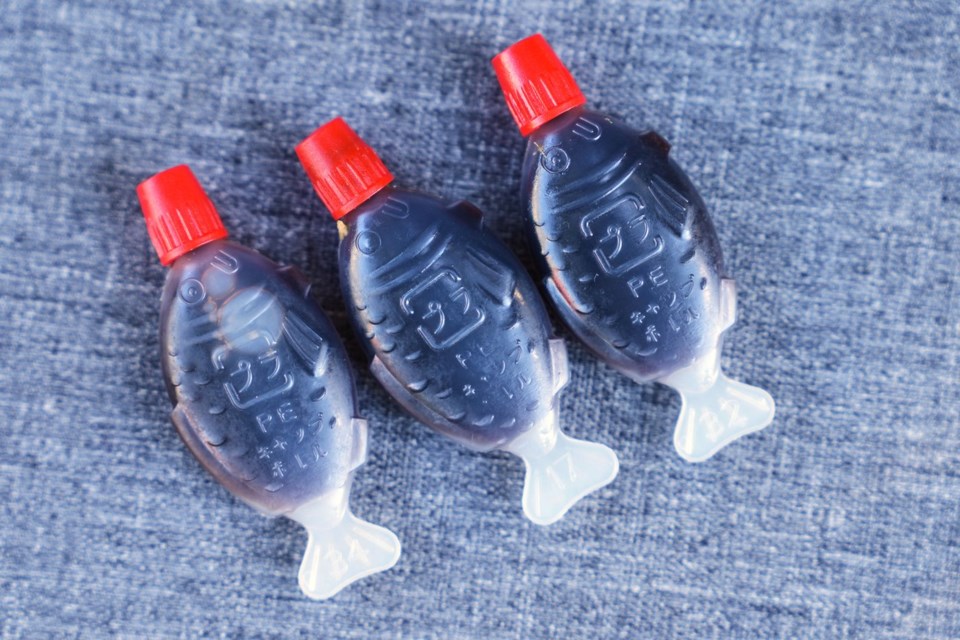Top Stories
South Australia Bans Fish-Shaped Soy Sauce Bottles Amid Plastic Crackdown

Plastic soy sauce bottles shaped like fish are now banned in South Australia as part of the state’s ongoing efforts to reduce plastic waste. The ban, effective from Monday, specifically targets these decorative containers, which officials argue pose a significant environmental threat.
The unique ban on fish-shaped bottles stems from concerns over their impact on marine life. According to South Australia Deputy Premier Susan Close, these small bottles can easily be lost, blown away, or washed into drainage systems, ultimately making their way into oceans. Close stated that the bottles are often too small to be effectively sorted in recycling processes and frequently end up in landfills or contribute to plastic pollution in the environment.
New Regulations for Condiment Containers
Restaurants and food establishments in South Australia must now transition to larger, refillable condiment containers or utilize less harmful single-use alternatives. These alternatives may include sachets, squeezable packs, or compostable vessels. The ban applies to containers that hold less than 30 milliliters (1 ounce) of soy sauce and includes various bottle shapes, such as rectangular containers equipped with caps or stoppers.
In addition to the ban on fish-shaped bottles, other items have also fallen under the new regulations. Effective from Monday, South Australia has prohibited plastic cutlery and straws that are attached to food items, similar to those commonly found with juice boxes. This move is part of a broader strategy that began in 2009, when South Australia became the first state to ban single-use plastic shopping bags. Since then, the state has enacted further restrictions on plastic straws, cutlery, and numerous forms of single-use packaging.
The state’s Environment Protection Authority is responsible for enforcing these laws, with penalties ranging from warnings to potential prosecution for non-compliance.
Global Context of Plastic Bans
The ban on fish-shaped soy sauce bottles is one of several initiatives as governments worldwide seek to combat the rising tide of plastic pollution. The United Nations Environment Programme reports that approximately 2,000 garbage trucks worth of plastic waste are dumped into oceans, rivers, and lakes every day. This alarming trend contributes to environmental degradation and poses risks to marine ecosystems and human health.
Currently, less than 15% of single-use plastic items are recycled, while the vast majority ends up in landfills or is mismanaged. The urgency for global action is underscored by stalled negotiations on a comprehensive treaty aimed at addressing plastic pollution.
As South Australia leads the way in plastic reduction efforts, it continues to evaluate additional items for prohibition. Next on the agenda are stickers commonly used on fresh produce, such as apples, which were initially set to be banned in 2025. This decision was postponed after producers raised concerns about increased costs and potential disruption to the supply chain of fresh fruits and vegetables across Australian states.
The move to eliminate plastic waste demonstrates a growing awareness of environmental issues and reflects the commitment of various governments to seek sustainable alternatives.
-

 Education3 months ago
Education3 months agoBrandon University’s Failed $5 Million Project Sparks Oversight Review
-

 Science4 months ago
Science4 months agoMicrosoft Confirms U.S. Law Overrules Canadian Data Sovereignty
-

 Lifestyle3 months ago
Lifestyle3 months agoWinnipeg Celebrates Culinary Creativity During Le Burger Week 2025
-

 Health4 months ago
Health4 months agoMontreal’s Groupe Marcelle Leads Canadian Cosmetic Industry Growth
-

 Science4 months ago
Science4 months agoTech Innovator Amandipp Singh Transforms Hiring for Disabled
-

 Technology3 months ago
Technology3 months agoDragon Ball: Sparking! Zero Launching on Switch and Switch 2 This November
-

 Education3 months ago
Education3 months agoRed River College Launches New Programs to Address Industry Needs
-

 Technology4 months ago
Technology4 months agoGoogle Pixel 10 Pro Fold Specs Unveiled Ahead of Launch
-

 Business3 months ago
Business3 months agoRocket Lab Reports Strong Q2 2025 Revenue Growth and Future Plans
-

 Technology2 months ago
Technology2 months agoDiscord Faces Serious Security Breach Affecting Millions
-

 Education3 months ago
Education3 months agoAlberta Teachers’ Strike: Potential Impacts on Students and Families
-

 Science3 months ago
Science3 months agoChina’s Wukong Spacesuit Sets New Standard for AI in Space
-

 Education3 months ago
Education3 months agoNew SĆIȺNEW̱ SṮEȽIṮḴEȽ Elementary Opens in Langford for 2025/2026 Year
-

 Technology4 months ago
Technology4 months agoWorld of Warcraft Players Buzz Over 19-Quest Bee Challenge
-

 Business4 months ago
Business4 months agoNew Estimates Reveal ChatGPT-5 Energy Use Could Soar
-

 Business3 months ago
Business3 months agoDawson City Residents Rally Around Buy Canadian Movement
-

 Technology2 months ago
Technology2 months agoHuawei MatePad 12X Redefines Tablet Experience for Professionals
-

 Business3 months ago
Business3 months agoBNA Brewing to Open New Bowling Alley in Downtown Penticton
-

 Technology4 months ago
Technology4 months agoFuture Entertainment Launches DDoD with Gameplay Trailer Showcase
-

 Technology4 months ago
Technology4 months agoGlobal Launch of Ragnarok M: Classic Set for September 3, 2025
-

 Technology4 months ago
Technology4 months agoInnovative 140W GaN Travel Adapter Combines Power and Convenience
-

 Science4 months ago
Science4 months agoXi Labs Innovates with New AI Operating System Set for 2025 Launch
-

 Top Stories2 months ago
Top Stories2 months agoBlue Jays Shift José Berríos to Bullpen Ahead of Playoffs
-

 Technology4 months ago
Technology4 months agoNew IDR01 Smart Ring Offers Advanced Sports Tracking for $169










